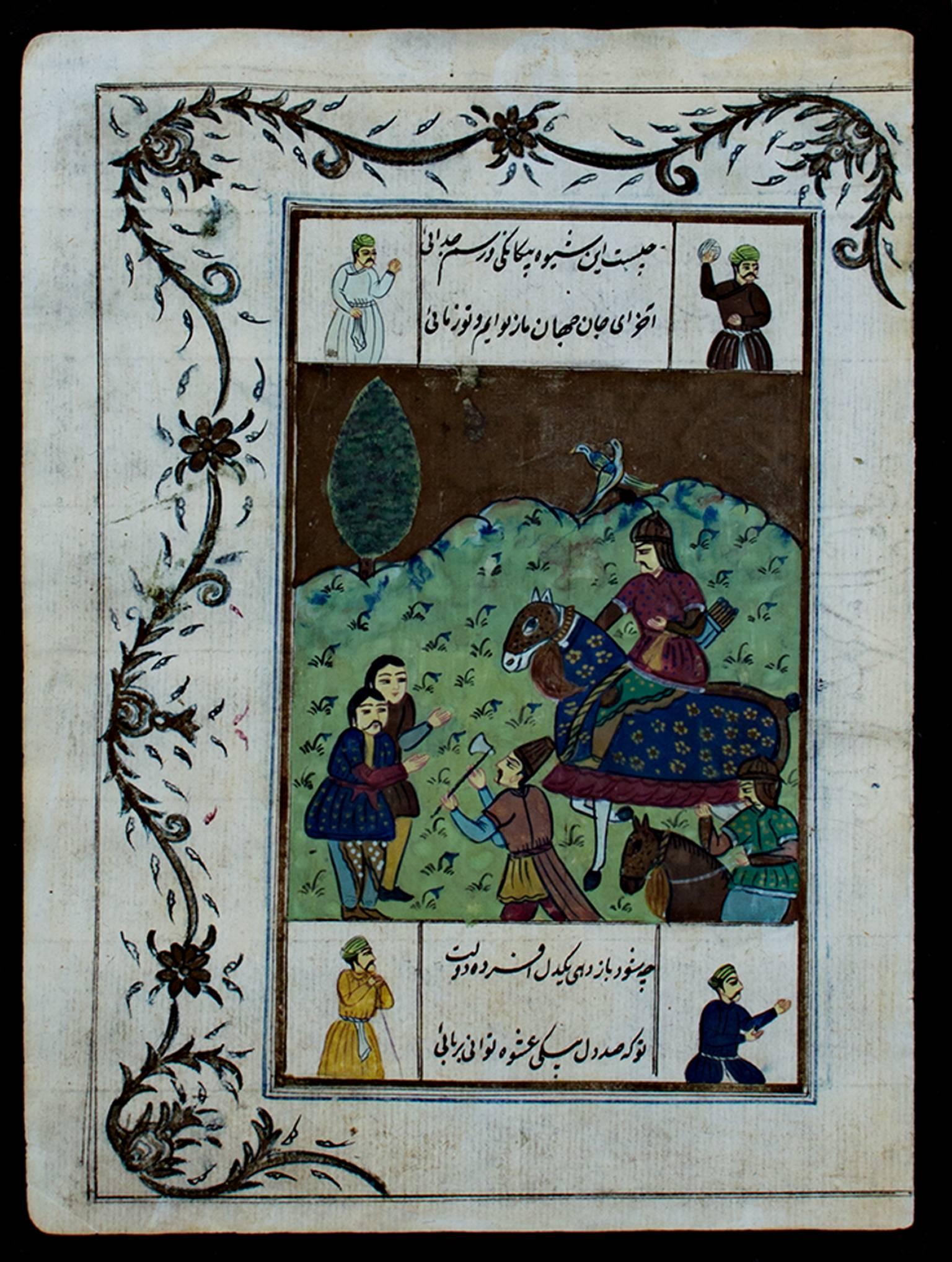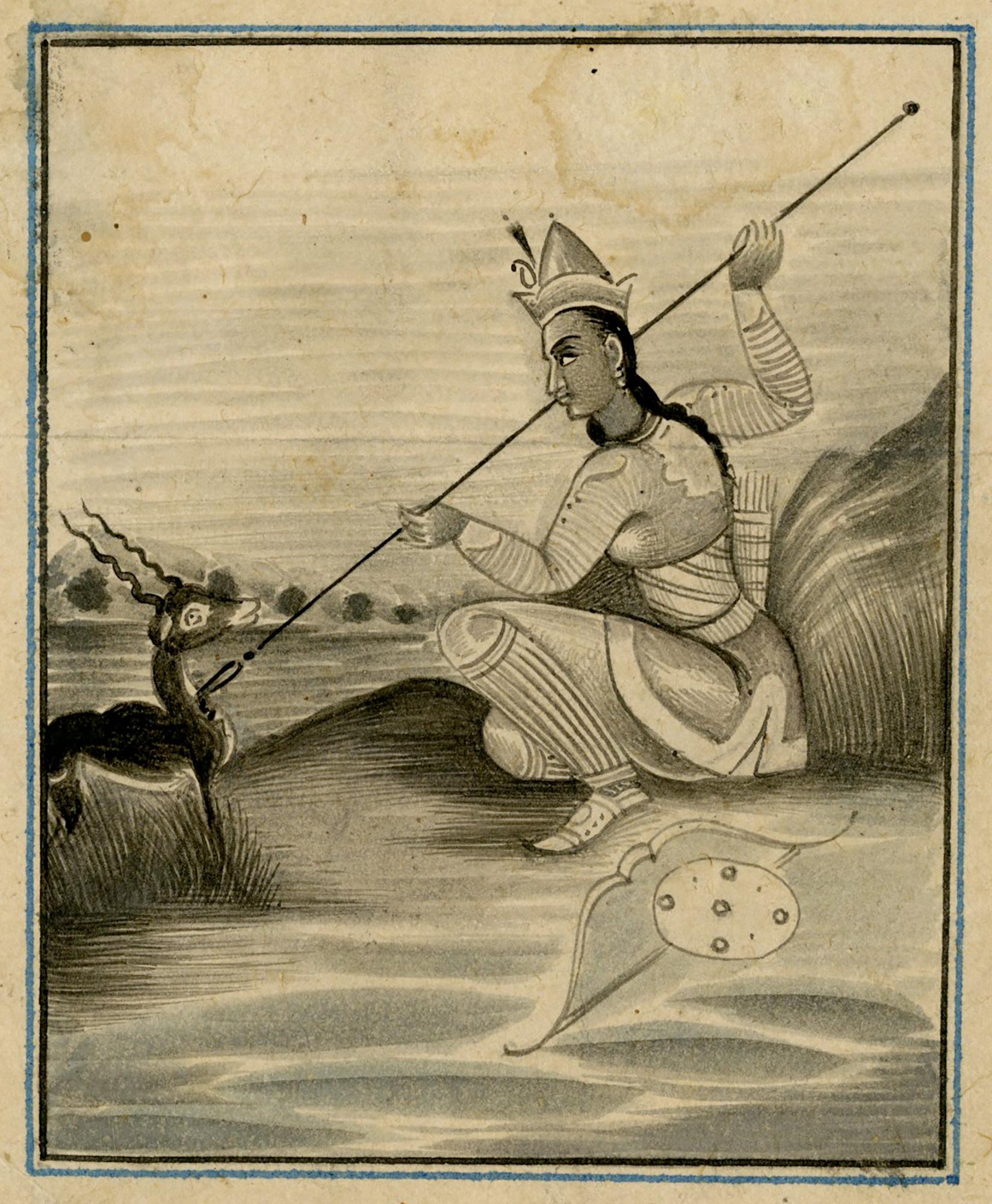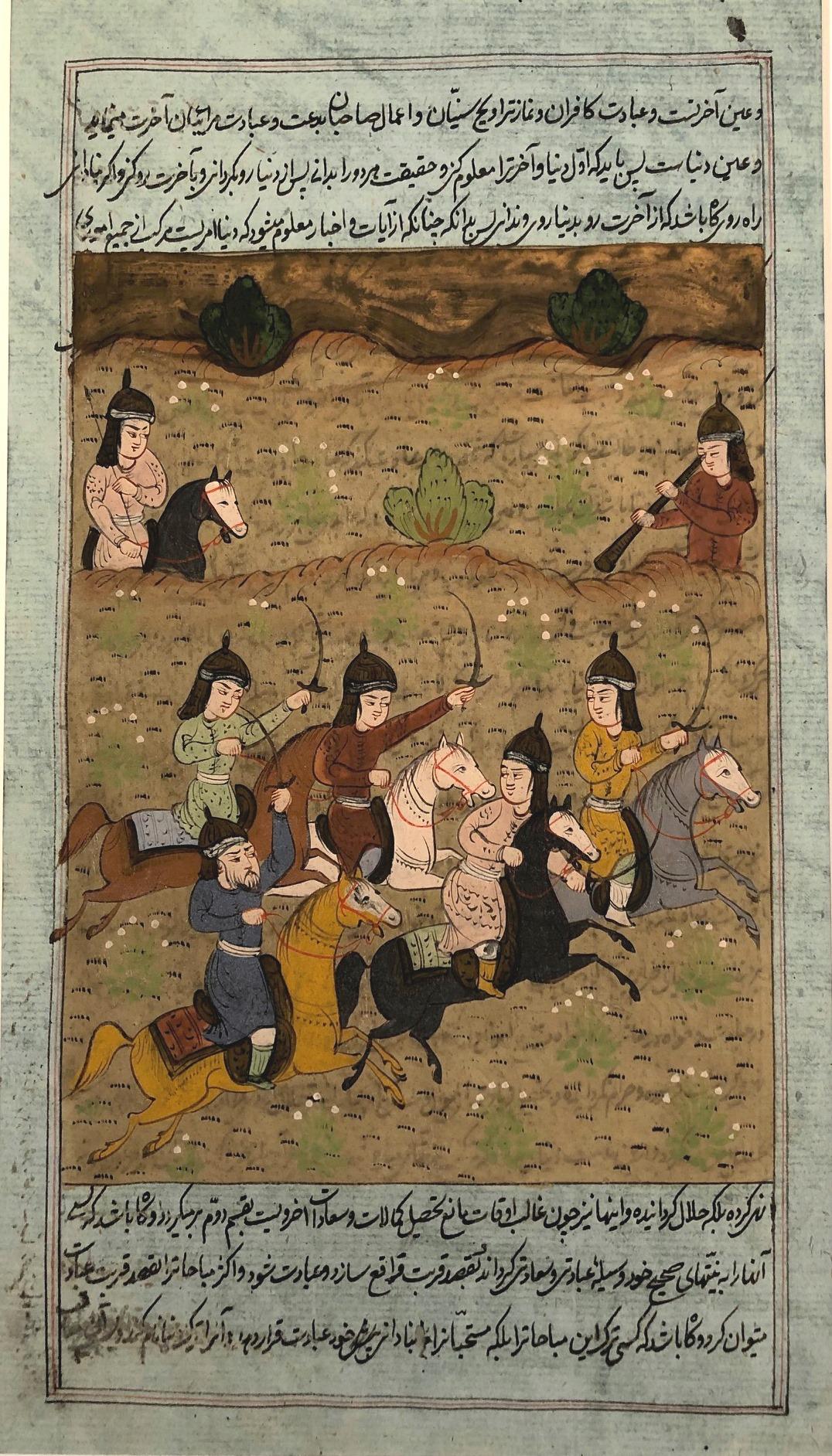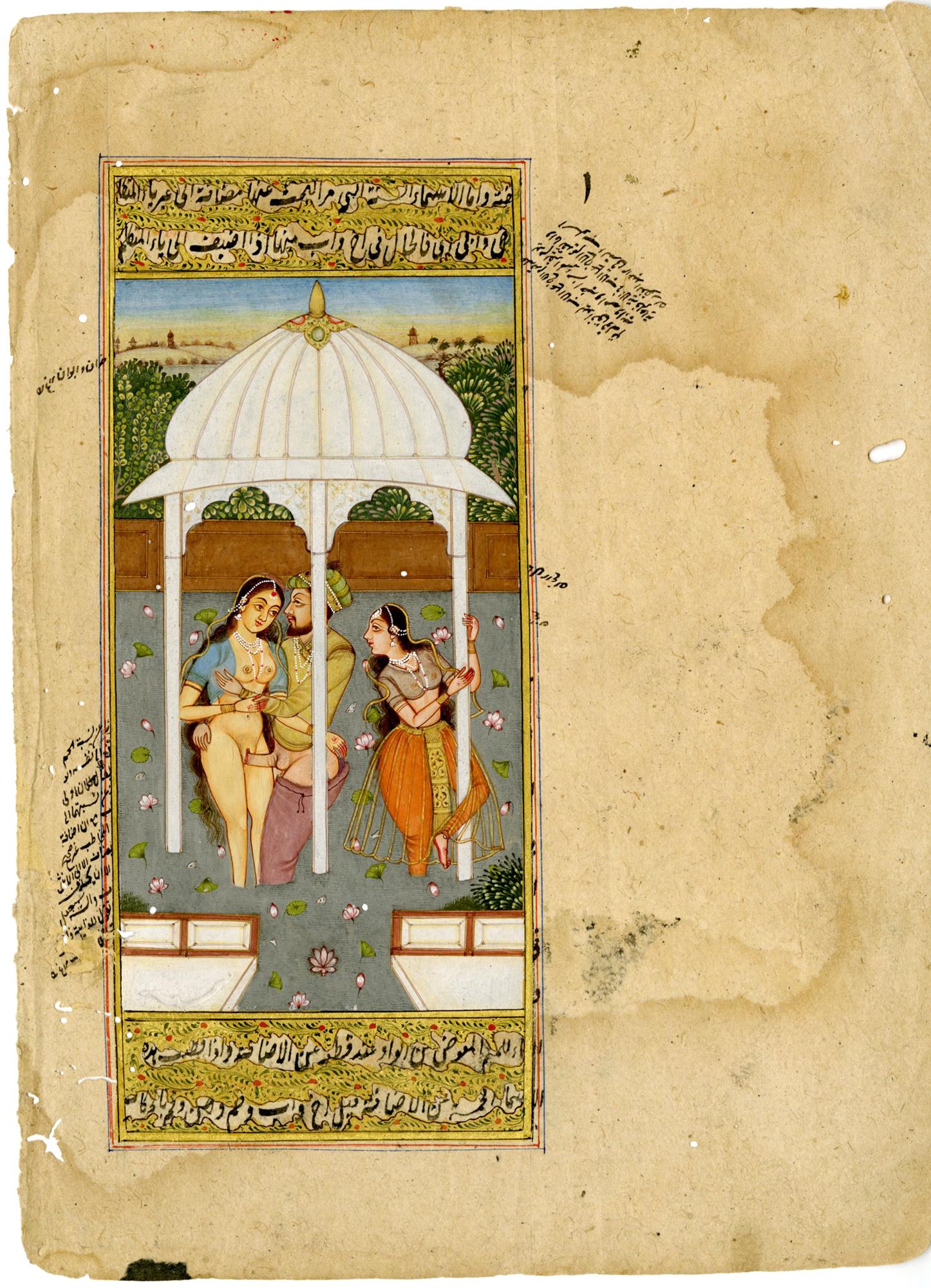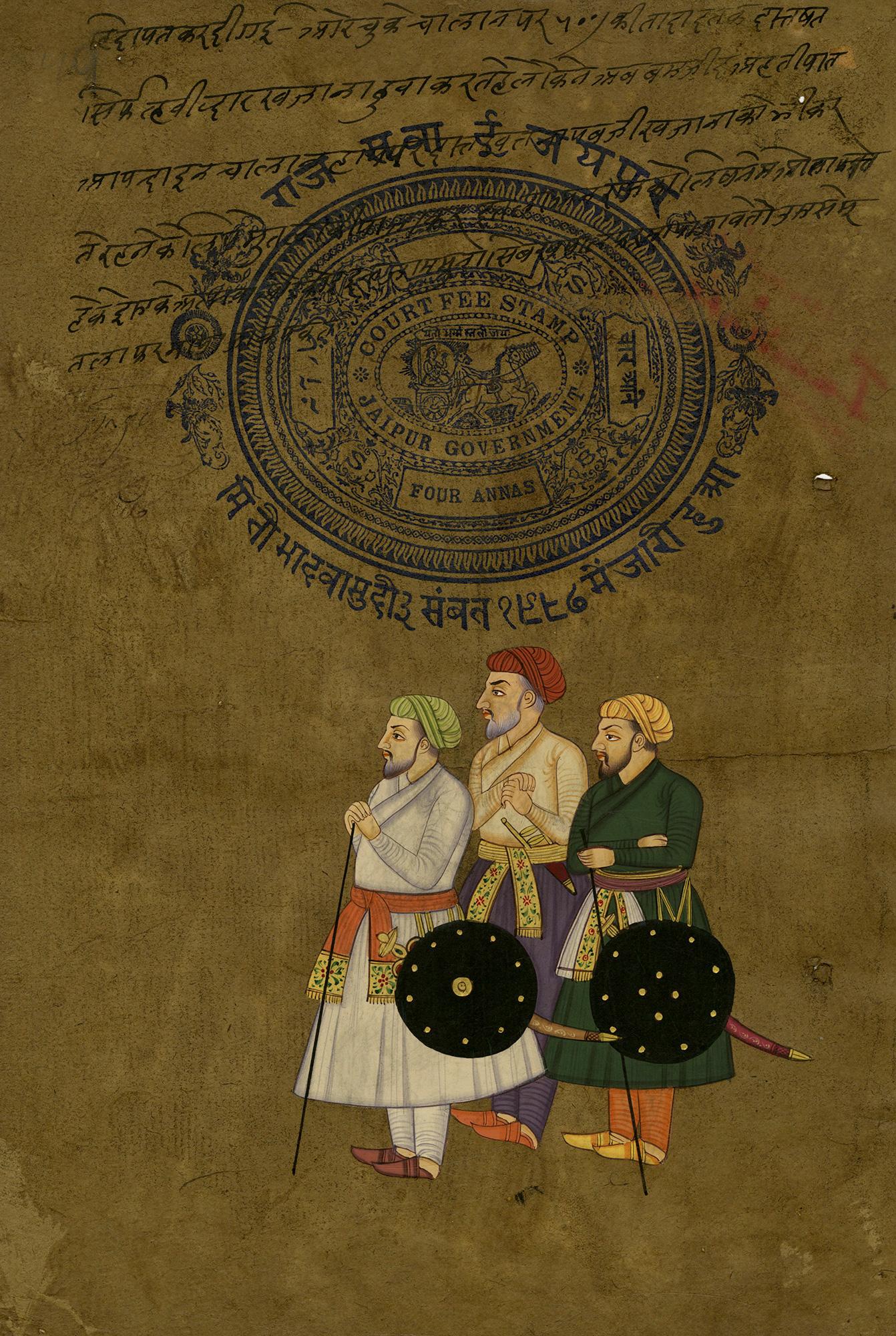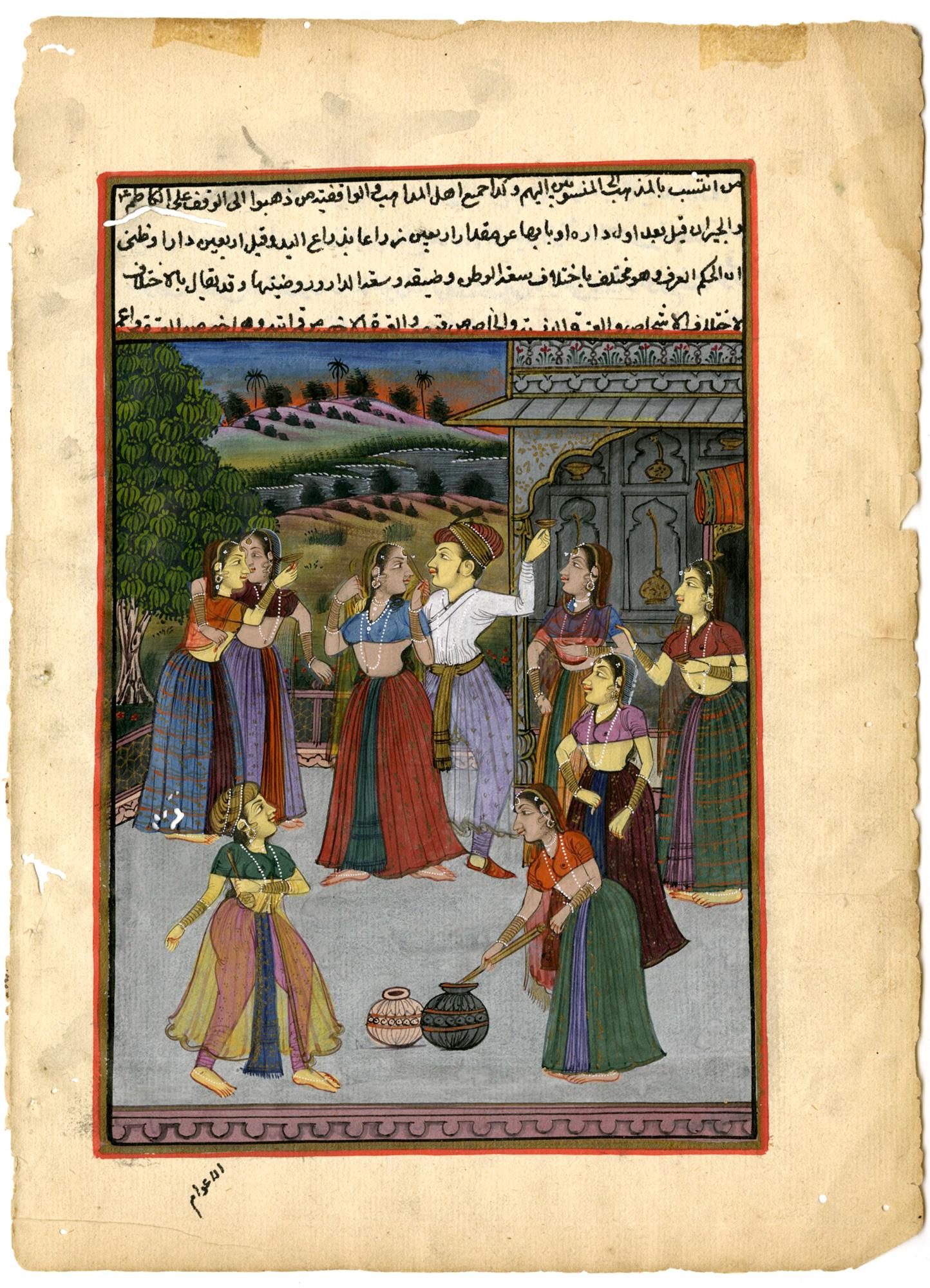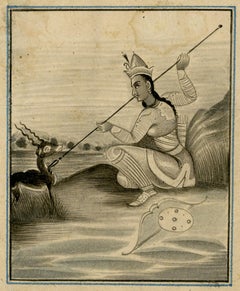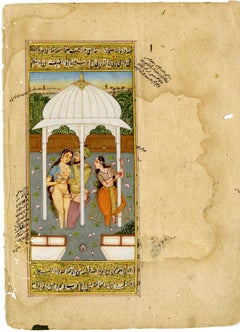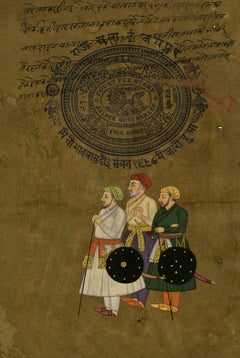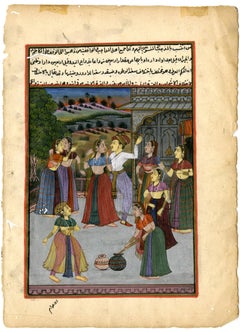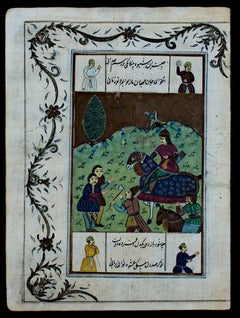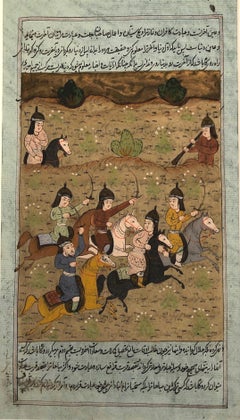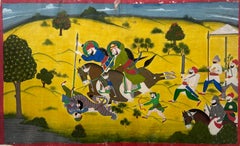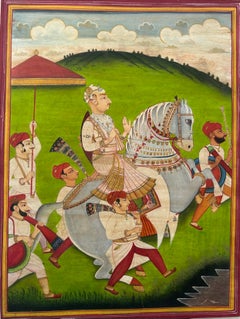Items Similar to Mughal School, 17th century Tiger Hunt near the Jahangir Maha, Agra
Want more images or videos?
Request additional images or videos from the seller
1 of 3
UnknownMughal School, 17th century Tiger Hunt near the Jahangir Maha, Agra1690
1690
$850
£644.67
€740.43
CA$1,217.74
A$1,340.64
CHF 685.21
MX$16,000.96
NOK 8,724.14
SEK 8,163.85
DKK 5,530.58
About the Item
An illuminated page from a book likely in reference to palace life during Emperor Jahangir's reign over the Mughal Empire.
c 1690. Gouache and ink with heightening in gold on light weight brown laid paper, 10 1/4 x 6 1/8 inches (260 x 156 mm), the full sheet. Extensive insect damage in the unpainted areas, primarily in the margins. Extensive hand inscriptions in black and red ink on the verso. Colors are exceptionally bright and fresh with good saturation.
Mirza Nur-ud-Din Muhammad Salim (30 August 1569 – 28 October 1627), known by his imperial name Jahangir ("Conqueror of the World'), was the fourth Mughal Emperor, who ruled from 1605 until his death in 1627. He was the third and only surviving son of Akbar and his chief empress, Mariam-uz-Zamani, born to them in the year 1569. He was named after the Indian Sufi saint, Salim Chishti.
-Singh, Pashaura; Fenech, Louis E., eds. (2014). The Oxford handbook of Sikh studies. Oxford University Press. p. 647. ISBN 978-0-19-969930-8.
- Creation Year:1690
- Dimensions:Height: 9.85 in (25 cm)Width: 6.15 in (15.6 cm)
- Medium:
- Movement & Style:
- Period:
- Condition:
- Gallery Location:Middletown, NY
- Reference Number:Seller: BH9131stDibs: LU1979213838572
About the Seller
5.0
Vetted Professional Seller
Every seller passes strict standards for authenticity and reliability
Established in 2004
1stDibs seller since 2022
75 sales on 1stDibs
Typical response time: 8 hours
- ShippingRetrieving quote...Shipping from: Middletown, NY
- Return Policy
Authenticity Guarantee
In the unlikely event there’s an issue with an item’s authenticity, contact us within 1 year for a full refund. DetailsMoney-Back Guarantee
If your item is not as described, is damaged in transit, or does not arrive, contact us within 7 days for a full refund. Details24-Hour Cancellation
You have a 24-hour grace period in which to reconsider your purchase, with no questions asked.Vetted Professional Sellers
Our world-class sellers must adhere to strict standards for service and quality, maintaining the integrity of our listings.Price-Match Guarantee
If you find that a seller listed the same item for a lower price elsewhere, we’ll match it.Trusted Global Delivery
Our best-in-class carrier network provides specialized shipping options worldwide, including custom delivery.More From This Seller
View AllMughal School, 19th century Empress Nur Jahan hunting an Indian Gazelle.
Located in Middletown, NY
Circa 1890. Pencil and black ink on cream laid paper with a border drawn in light blue ink, 6 x 5 1/8 inches (153 x 130 mm). Scattered light surface soiling and multiple soft horizontal folds.
Nur Jahan was fond of hunting and often went on hunting tours with her husband and was known for her boldness in hunting ferocious tigers. She is reported to have slain four tigers with six bullets during one hunt. According to Sir Syed Ahmad Khan this feat, inspired a poet to declaim a spontaneous couplet in her honor: "Though Nur Jahan be in form a woman, In the ranks of men she...
Category
19th Century Rajput Figurative Drawings and Watercolors
Materials
Gold
Mughal School, 18th century – Emperor Jahangir in his harem in flagrante delicto
Located in Middletown, NY
Emperor Jahangir in his harem surrounded by lotus blossoms; symbols of paradise itself.
Circa 1690. Gouache and ink with gold heightening on cream laid paper, 8 1/2 x 6 1/4 inches (...
Category
17th Century Rajput Figurative Drawings and Watercolors
Materials
Gold
Three hunters; two with a spear and dagger... Rajasthani School, 19th century
Located in Middletown, NY
Ink and gouache with gold heightening on brown laid paper with a Jaipur Court Fee tax stamp in black ink, 12 5/8 x 8 9/16 inches (320 x 217 mm). Toning, handling creases and minor sc...
Category
19th Century Rajput Figurative Drawings and Watercolors
Materials
Gold
Mughal School, 18th century – Emperor Jahangir dancing with his harem attendees
Located in Middletown, NY
A joyful scene of lighthearted merriment in the palace of Jangahir Mahal Agra
Circa 1750. Gouache and ink with gold heightening on light weight cream laid paper, 8 1/4 x 6 inches (2...
Category
18th Century Rajput Figurative Drawings and Watercolors
Materials
Gold
Mughal School, 18th Century Emperor Jahangir with Empress Nur Jahan
Located in Middletown, NY
Emperor Jahangir and Empress Nur Jahan exchanging lotus blossoms; a symbol of beauty, purity, honesty, rebirth, self-regeneration, and enlightenment....
Category
18th Century Rajput Figurative Drawings and Watercolors
Materials
Gold
Mughal School, 18th century Emperor Jangahir on a pleasure boat with his harem a
Located in Middletown, NY
Emperor Jahangir depicted with his harem attendees aboard a pleasure cruise, the water filled with lotus blossoms; symbols of paradise itself.
Circa 1750. Gouache and ink with gold ...
Category
18th Century Rajput Figurative Drawings and Watercolors
Materials
Gold
You May Also Like
"Two Warriors on Horseback, Foot Soldier, and Civilians, " Persian Book Page
Located in Milwaukee, WI
"Two Warriors on Horseback, Foot Soldier, and Civilians" is an original gold and tempera painting by an unknown Persian artist from the late 19th ...
Category
Late 19th Century Rajput Figurative Drawings and Watercolors
Materials
Gold Leaf
19th Century Mughal Painting of Battle scene
Located in Greenwich, CT
An illuminated page from a book likely in reference to Emperor Jahangir's reign over the Mughal Empire.
Gouache and ink on light weight cream laid paper circa 1800 or earlier,
Exte...
Category
Late 19th Century Other Art Style Paintings
Materials
Gouache
Kota School Large 19th century Indian Miniature Painting Private UK Collection
Located in Norfolk, GB
Kotah School, c.1880
A fine Kotah School miniature painting, c 1880. Examined by the British Museum in 2015. There is a similar known composition in the collection of LACMA depicti...
Category
19th Century Other Art Style Figurative Paintings
Materials
Watercolor, Paper
Indian Miniature Painting Mewar Maharaja on Horse Courtly India Master Artist
Located in Norfolk, GB
Banwari Lal Jangid
Mewar School, Maharaja on horseback with guards
Size: 37.2 x 28.2 cm
Natural Pigment on Handmade paper
20th Century
This is a fabulous miniature painting by one ...
Category
20th Century Other Art Style Figurative Paintings
Materials
Paper, Watercolor
India Miniature Painting Pahari School Late 19th Century Forest Mythology Scene
Located in Norfolk, GB
Paper Size: 24.5 x 18.3 cm
Mount Size: 35.8 x 27.8 cm
More details to follow
Category
Late 19th Century Other Art Style Figurative Paintings
Materials
Paper, Watercolor, Pigment
Persian Illuminated Miniature with Four Figures Playing Polo in a Landscape
Located in Milwaukee, WI
The present illuminated folio page contains a fine miniature depicting four figures playing polo. Polo, also called 'chagun,' was the sport of kings and princes of central Asia and Iran, and the sport probably originated there in the 6th century BCE. Polo matches appear in a large number of early Persian texts, including in the writings of the 10th century epic writer Abu l-Qasim al-Firdawsi: He describes numerous polo matches in his famous 'Shahnameh' (The Persian Book of Kings). This particular illumination also is closely related to an example held at the Smithsonian Museum of Asian Art: a folio from 'Guy u Chawgan' (The ball and the polo-mallet) which shows a polo game with the dervish and the shah.
12 x 8.25 inches, artwork
19.75 x 15.88 inches, frame
accompanied on the back with an image of the verso
framed to conservation standards with a 100% rag silk-lined mat in a gold gilded frame
A Persian miniature is a small Persian painting on paper, whether a book illustration or a separate work of art intended to be kept in an album of such works called a muraqqa. The techniques are broadly comparable to the Western and Byzantine traditions of miniatures in illuminated manuscripts. Although there is an equally well-established Persian tradition of wall-painting, the survival rate and state of preservation of miniatures is better, and miniatures are much the best-known form of Persian painting in the West, and many of the most important examples are in Western, or Turkish, museums. Miniature painting became a significant genre in Persian art in the 13th century, receiving Chinese influence after the Mongol conquests, and the highest point in the tradition was reached in the 15th and 16th centuries. The tradition continued, under some Western influence, after this, and has many modern exponents. The Persian miniature was the dominant influence on other Islamic miniature traditions, principally the Ottoman miniature...
Category
19th Century Other Art Style Figurative Paintings
Materials
Ink, Tempera, Laid Paper
